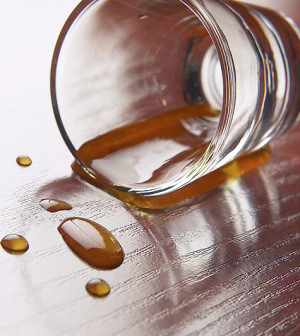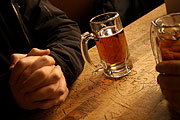- 8 Ways to Increase Dopamine Naturally
- 7 Best Breads for Maintaining Stable Blood Sugar
- Gelatin vs. Collagen: Which is Best for Skin, Nails, and Joints?
- The Long-Term Effects of Daily Turmeric Supplements on Liver Health
- Could Your Grocery Store Meat Be Causing Recurring UTIs?
- Are You Making This Expensive Thermostat Error This Winter?
- Recognizing the Signs of Hypothyroidism
- 10 Strategies to Overcome Insomnia
- Could Artificial Sweeteners Be Aging the Brain Faster?
- Techniques for Soothing Your Nervous System
Fake ID Use Tied to High-Risk Drinking by Underage Students


THURSDAY, Oct. 17Among students who had already consumed alcohol by their first year of college, two-thirds of those who were underage used fake identification to buy booze, a new study of U.S. students finds.
Underage students tend to drink less frequently than older students, but the use of fake IDs might lead them to drink more often and increase their risk of developing drinking problems, the researchers said.
The study, published online Oct. 17 and in an upcoming print issue of Alcoholism: Clinical & Experimental Research, included 529 females and 486 males. All had consumed alcohol at least once by their first year of college, and were followed-up for the first four years of college.
About 66 percent of the underage students used false IDs, and of those, they used the fake IDs about one-fourth of the time they drank before turning 21, corresponding study author Amelia Arria said in a journal news release.
The study also “demonstrated that false ID use led to increases in drinking frequency and quantity,” said Arria, director of the Center on Young Adult Health and Development at the University of Maryland School of Public Health.
In addition, “we showed that while false ID use wasn’t directly related to [alcohol use disorders] risk; it indirectly predicted increases in [alcohol use disorders] risk over time through its contribution to increases in drinking frequency,” she said.
The study also identified “younger age at first drink of alcohol, greater levels of alcohol and drug involvement during high school, higher levels of sensation-seeking, Greek life involvement and living off-campus” as predictors of how often students used false IDs, Arria noted.
She said it’s not clear whether the findings would apply to young adults under 21 who aren’t in college and said further research is needed to determine if that’s the case.
Jennifer Read is an associate professor in the department of psychology at the State University of New York at Buffalo. “I think some of the most important findings to come out of this study have to do with how widespread this problem is,” Read stated in the news release.
“I was surprised that almost two-thirds of the students used false IDs. It will be interesting to see if this reflects something specific to this university or region in Dr. Arria’s study, or if the use of false IDs is this ubiquitous across campuses in the U.S.,” said Read, who was not involved in the study.
More information
The U.S. Centers for Disease Control and Prevention has more about underage drinking.
Source: HealthDay
Copyright © 2026 HealthDay. All rights reserved.










